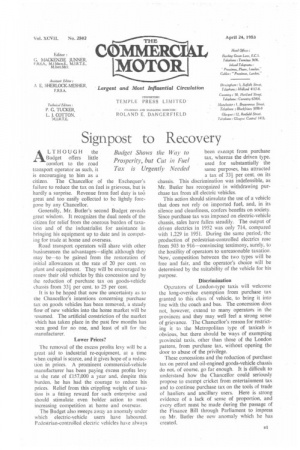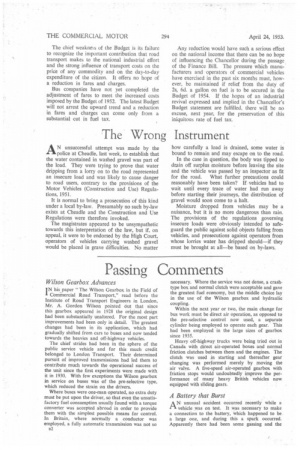Signpost to Recovery
Page 35

Page 36

If you've noticed an error in this article please click here to report it so we can fix it.
ALTHouGH the Budget offers little comfort to the road transport operator as such, it is encouraging to him .as a citizen. The Chancellor of the Exchequer's failure to reduce the tax on fuel is grievous, but is hardly a surprise. Revenue from fuel duty is to6 great and too easily collected to he lightly foregone by any Chancellor.
Generally, Mr. Butler's second Budget reveals great wisdom. It recognizes the dual needs of the citizen for relief from the onerous burden of taxation and of the industrialist for assistance in bringing his equipment up to date and in competing for trade at home and overseas.
Road transport operators will share with other businessmen the advantages—slight although they may be—to be gained from the restoration of initial allowances at the rate of 20 per cent. on plant and equipment. They will be encouraged to renew their old vehicles by this concession and by the reduction of purchase tax on goods-vehicle chassis from 331 per cent. to 25 per cent.
It is to be hoped that now the uncertainty as to the Chancellor's intentions concerning purchase tax on goods vehicles has been removed, a steady flow of' new vehicles into the home market will be resumed. The artificial constriction of the market vhich has taken place in the past few months has :leen good for no one, and least of all for the manufacturer.
Lower Prices?
The removal of the excess prolits levy will be a great :aid to industrial re-equipment, at a time when capital is scarce, and it gives hope of a reduction in prices. A prominent commercial-vehicle manufacturer has been paying excess profits levy at the rate of £157,000 a year and, despite this burden, he has had the courage to reduce his prices. Relief from this crippling weight of taxation is a fitting reward for -such enterprise and should stimulate even bolder action to meet increasing competition at home and overseas.
The Budget also sweeps away an anomaly under which electric-vehicle users have laboured: Pedestrian-controlled electric vehicleshave always been exempt from purchase tax, whereas the driven type, used for substantially the same purposes, has attracted a tax of 331 per cent. on its chassis. This discrimination was indefensible, as Mr. Butler has recognized in withdrawing purchase tax from all electric vehicles.
This action should stimulate the use of a vehicle that does not rely on imported fuel, and, in its silence and cleanliness, confers benefits on society. Since purchase tax was imposed on electric-vehicle chassis, sales have fallen steadily. The output of driven electrics in 1952 was only 714, compared with 1,229 in 1951. During the same period,' the production of pedestrian-controlled electrics rose from 503 to 916—convincing testimony, surely, to the hostility of operators to unreasonable taxation. Now,' competition between the two types will be free and fair, and the operator's choice will be determined by the suitability of the vehicle for his purpose.
Discrimination Operators of London-type taxis will welcome the long-overdue exemption from purchase tax gi anted to this class of vehicle, to bring it into line with the coach and bus. The concession does not, however, extend to many operators in the provinces and they may, well feel a strong sense of grievance. The Chancellor's reason for restricting it to the Metropolitan type of taxicab is obvious, but there should be ways of exempting provincial taxis, other than those of the London pattern, from purchase tax, without opening the door to abuse of the privilege.
These concessions and the reduction of purchase tax on petrol and oil-engined goods-vehicle chassis do not, of course, go far enough. It is difficult to understand how the Chancellor could seriously propose to exempt cricket from entertainment tax and to continue purchase tax on the tools of trade of hauliers and ancillary users. Here is strong evidence of a lack of sense of proportion, and every effort must be made during the passage of the Finance. Bill through Parliament to impress on Mr. Butler the new anomaly which he has created. The chief weakness of the Budget is its failure to recognize the important contribution that road transport makes to the national industrial effort and the strong influence of transport costs on the price of any commodity and on the day-to-day expenditure of the citizen. It offers no hope of a reduction in fares and charges.
Bus companies have not yet completed the adjustment of fares to meet the increased costs imposed by the Budget of 1952. The latest Budget will not arrest the upward trend and a reduction in fares and charges can come only from a substantial cut in fuel tax. Any reduction would have such a serious effect on the national income that there can be no hope of influencing the Chancellor during the passage of the Finance Bill. The pressure which manufacturers and operators of commercial vehicles have exercised in the past six months must, however, be maintained if relief from the duty of 2s. 6d. a gallon on fuel is to be secured in the Budget of 1954. If the hopes of an industrial revival expressed and implied in the Chancellor's Budget statement are fulfilled, there will be no excuse, next year, for the preservation of this iniquitous rate of fuel tax.




































































































